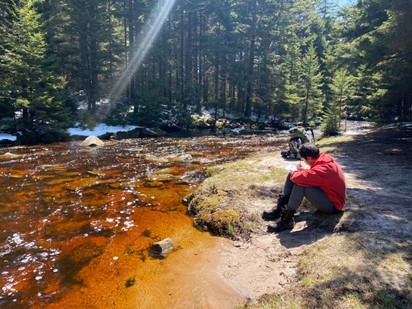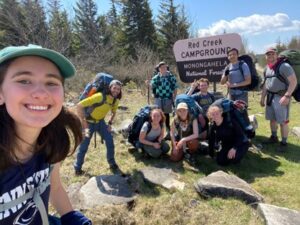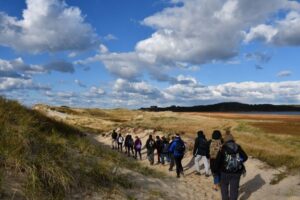From the Page to the Wilderness: Penn State Students Adventure with “Unparalleled” Program

Are you a fan of literature that transports you to the natural world and away from the traditional city landscape? Do you enjoy getting your hands dirty and learning new life skills? Rather than simply reading novels in traditional classroom settings, Penn State students can experience “unparalleled” opportunities exploring the intersection of literature and nature through the Adventure Literature Program.
Adventure Literature courses integrate literary studies with the outdoors, enabling students to participate in conversations about nature, the wilderness, and American culture in an interactive environment, according to the Department of English website. The Adventure Literature Program rotates through a selection of topics each semester, offering courses focused on specific locales like Cape Cod and the Chesapeake Bay as well as outdoor activities like rock climbing and fly fishing.
Talley Kayser, assistant teaching professor of English, came to Penn State in 2017 to steward the Adventure Literature series as program director. Prior to Kayser’s arrival, Dr. Bob Burkholder founded and led the program, which has transformed over the years to include an array of new offerings. Kayser said she felt ecstatic at the opportunity to teach “these really unusual, but wonderfully dynamic courses.” When the position was advertised, Kayser said she “immediately saw that this would be a chance to marry and fuse the two loves of [her] life.”
The coronavirus pandemic posed challenges for the program; however, Kayser and the other Adventure Literature instructors adjusted to the difficult circumstances to provide students with meaningful experiences. Many of Penn State’s Adventure Literature courses leverage “long-standing relationships with local partners to help complete key pieces of the field experiences,” Kayser said. These local connections and organizational partners helped Adventure Literature instructors like Kayser adapt the learning experience for students, especially when travel restrictions and pandemic health regulations prevented typical explorations.

For instance, Kayser explained, to immerse students in virtual field experiences within the Chesapeake Bay and Cape Cod courses, program partners helped them “get a sense of the landscape” by interviewing locals and sharing resources. Although the students couldn’t physically interact with locals at the waterside, Kayser said they could get a “sense of the local richness, the local literary output, and the local culture in the virtual space while also empowering students to have their own adventures.”
Adjustments were also made for the Wilderness Literature course, which typically includes a four-day backpacking trip in Dolly Sods Wilderness in West Virginia. Rather than taking students on the usual trip, Kayser and her colleagues helped prepare students for hypothetical experiences. Students designed personalized backpacking trips to a place of their choosing, and instructors offered feedback on how to safely and appropriately plan their experience. Similar to the typical Adventure Literature trip, Kayser said the class thoroughly researched local environmental regulations and sought to understand the resources that should be packed for the selected landscape.
“We hoped that if we couldn’t give students the experiences of being in these places, we could empower students to go find those experiences on their own and to go into them feeling safe and prepared,” Kayser said.
Tim Mateer, a Ph.D. student in recreation, park and tourism management, participated in the Adventure Literature program for the first time in spring 2021 during COVID-19 restrictions and has since led in-person trips for the program. Though Mateer grew up in a “not-very-outdoorsy family,” he said he had a strong interest in backpacking, hiking, and outdoor exploration.
When Mateer began participating in outdoor activities, he lacked experience and knowledge about the appropriate and safe ways to interact with the environment. However, he said the Adventure Literature program acts as an “awesome way to break down barriers” and “an accessible way for people to get outside,” especially for students with a similar background to his own.
Mateer explained that Adventure Literature instructors teach students the “hard skills,” so they can have their own outdoor experiences “in a way that is safe, that is accessible, [and] that one can feel competent in navigating the various challenges that outdoor adventures can throw at them.” He said the program prepares students for weather events, how to use one’s gear, and similar tasks that would be applicable in outdoor situations.

One of Mateer’s favorite memories from the program occurred during the April 2022 backpacking trip to Dolly Sods when “adversity created bonding opportunities among the group.” When the students arrived at Dolly Sods, they needed to cross a river to reach one of the trails; however, the group experienced rough conditions due to high water levels from melting snow. After walking extra miles and configuring a new plan to approach the trail, Mateer said the group remained in “high spirits.”
“It was really satisfying [to] see everyone coming at this funny scenario and fully embracing it,” Mateer continued. “You don’t get moments like that in a traditional classroom setting. At face value, it probably [looked like] a fairly crappy situation. We hiked a bunch of miles and had to cross hills covered in mud and snow—but it created this group dynamic where people laughed and grew together.”
Mateer will be teaching an Adventure Literature course with Kayser in spring 2023. Having taught three classes thus far through his graduate program, Mateer shared that the Adventure Literature program “keeps it real for [him].”
“It makes the readings richer because you have your own experiences to pull from to relate to the [material], but then your own experiences are also so much deeper because you’ve been thinking about and processing these ideas throughout the semester,” Mateer expressed.
Despite the impacts of the pandemic, Kayser said the program has continued providing new and engaging experiences for students and herself. Kayser shared that she enjoys working with students in the field since it facilitates “more meaningful interactions” than those generated in a typical classroom.
“I hike with my students, I fish with my students, and I rock climb with my students,” Kayser said. “We do scary, challenging, and thought-provoking things together, and that allows all of us in the learning community [to experience] a much more dynamic and authentic learning environment than the traditional literary study could offer on its own.”
Kayser said she’s witnessed students with expansive literary backgrounds “experience the camaraderie of outdoor spaces, overcome challenges, and get outside their comfort zone” by working within the natural environment. On the flip side, she has also worked with students who have hiked through the Appalachian Trail and hold vast outdoors experiences. After completing the course, Kayser observed, many of these students better understand how social constructs and expectations shape outdoor experiences.
“For a lot of students, the study of literature is the study of black and white marks on a page,” Kayser said. “It’s the study of ideas in the abstract, and as wonderful and pleasurable as it can be to study ideas in the abstract, what can be missing in traditional literary studies is a sense of how those black and white marks on a page have concrete impacts in the real world.”
Kayser will be teaching three Adventure Literature courses during the Spring 2023 semester, and she expressed excitement for the upcoming opportunities that will be available to students.

“Adventure Literature courses reward curiosity,” Kayser said. “They reward a community spirit. They reward a sort of craving for social connection, and they also reward resilience. They are particularly affirming and occasionally even life changing for students who are approaching the world with a spirit of openness and curiosity—those who want to step outside their comfort zone and try new things. That is the kind of student that really finds themselves thriving in these classes.”
Those interested in learning more about the Adventure Literature program can do so at the program’s website and can follow its Facebook page for updates.

Are you a fan of literature that transports you to the natural world and away from the traditional city landscape? Do you enjoy getting your hands dirty and learning new life skills? Rather than simply reading novels in traditional classroom settings, Penn State students can experience “unparalleled” opportunities exploring the intersection of literature and nature through the Adventure Literature Program.
Adventure Literature courses integrate literary studies with the outdoors, enabling students to participate in conversations about nature, the wilderness, and American culture in an interactive environment, according to the Department of English website. The Adventure Literature Program rotates through a selection of topics each semester, offering courses focused on specific locales like Cape Cod and the Chesapeake Bay as well as outdoor activities like rock climbing and fly fishing.
Talley Kayser, assistant teaching professor of English, came to Penn State in 2017 to steward the Adventure Literature series as program director. Prior to Kayser’s arrival, Dr. Bob Burkholder founded and led the program, which has transformed over the years to include an array of new offerings. Kayser said she felt ecstatic at the opportunity to teach “these really unusual, but wonderfully dynamic courses.” When the position was advertised, Kayser said she “immediately saw that this would be a chance to marry and fuse the two loves of [her] life.”
The coronavirus pandemic posed challenges for the program; however, Kayser and the other Adventure Literature instructors adjusted to the difficult circumstances to provide students with meaningful experiences. Many of Penn State’s Adventure Literature courses leverage “long-standing relationships with local partners to help complete key pieces of the field experiences,” Kayser said. These local connections and organizational partners helped Adventure Literature instructors like Kayser adapt the learning experience for students, especially when travel restrictions and pandemic health regulations prevented typical explorations.

For instance, Kayser explained, to immerse students in virtual field experiences within the Chesapeake Bay and Cape Cod courses, program partners helped them “get a sense of the landscape” by interviewing locals and sharing resources. Although the students couldn’t physically interact with locals at the waterside, Kayser said they could get a “sense of the local richness, the local literary output, and the local culture in the virtual space while also empowering students to have their own adventures.”
Adjustments were also made for the Wilderness Literature course, which typically includes a four-day backpacking trip in Dolly Sods Wilderness in West Virginia. Rather than taking students on the usual trip, Kayser and her colleagues helped prepare students for hypothetical experiences. Students designed personalized backpacking trips to a place of their choosing, and instructors offered feedback on how to safely and appropriately plan their experience. Similar to the typical Adventure Literature trip, Kayser said the class thoroughly researched local environmental regulations and sought to understand the resources that should be packed for the selected landscape.
“We hoped that if we couldn’t give students the experiences of being in these places, we could empower students to go find those experiences on their own and to go into them feeling safe and prepared,” Kayser said.
Tim Mateer, a Ph.D. student in recreation, park and tourism management, participated in the Adventure Literature program for the first time in spring 2021 during COVID-19 restrictions and has since led in-person trips for the program. Though Mateer grew up in a “not-very-outdoorsy family,” he said he had a strong interest in backpacking, hiking, and outdoor exploration.
When Mateer began participating in outdoor activities, he lacked experience and knowledge about the appropriate and safe ways to interact with the environment. However, he said the Adventure Literature program acts as an “awesome way to break down barriers” and “an accessible way for people to get outside,” especially for students with a similar background to his own.
Mateer explained that Adventure Literature instructors teach students the “hard skills,” so they can have their own outdoor experiences “in a way that is safe, that is accessible, [and] that one can feel competent in navigating the various challenges that outdoor adventures can throw at them.” He said the program prepares students for weather events, how to use one’s gear, and similar tasks that would be applicable in outdoor situations.

One of Mateer’s favorite memories from the program occurred during the April 2022 backpacking trip to Dolly Sods when “adversity created bonding opportunities among the group.” When the students arrived at Dolly Sods, they needed to cross a river to reach one of the trails; however, the group experienced rough conditions due to high water levels from melting snow. After walking extra miles and configuring a new plan to approach the trail, Mateer said the group remained in “high spirits.”
“It was really satisfying [to] see everyone coming at this funny scenario and fully embracing it,” Mateer continued. “You don’t get moments like that in a traditional classroom setting. At face value, it probably [looked like] a fairly crappy situation. We hiked a bunch of miles and had to cross hills covered in mud and snow—but it created this group dynamic where people laughed and grew together.”
Mateer will be teaching an Adventure Literature course with Kayser in spring 2023. Having taught three classes thus far through his graduate program, Mateer shared that the Adventure Literature program “keeps it real for [him].”
“It makes the readings richer because you have your own experiences to pull from to relate to the [material], but then your own experiences are also so much deeper because you’ve been thinking about and processing these ideas throughout the semester,” Mateer expressed.
Despite the impacts of the pandemic, Kayser said the program has continued providing new and engaging experiences for students and herself. Kayser shared that she enjoys working with students in the field since it facilitates “more meaningful interactions” than those generated in a typical classroom.
“I hike with my students, I fish with my students, and I rock climb with my students,” Kayser said. “We do scary, challenging, and thought-provoking things together, and that allows all of us in the learning community [to experience] a much more dynamic and authentic learning environment than the traditional literary study could offer on its own.”
Kayser said she’s witnessed students with expansive literary backgrounds “experience the camaraderie of outdoor spaces, overcome challenges, and get outside their comfort zone” by working within the natural environment. On the flip side, she has also worked with students who have hiked through the Appalachian Trail and hold vast outdoors experiences. After completing the course, Kayser observed, many of these students better understand how social constructs and expectations shape outdoor experiences.
“For a lot of students, the study of literature is the study of black and white marks on a page,” Kayser said. “It’s the study of ideas in the abstract, and as wonderful and pleasurable as it can be to study ideas in the abstract, what can be missing in traditional literary studies is a sense of how those black and white marks on a page have concrete impacts in the real world.”
Kayser will be teaching three Adventure Literature courses during the Spring 2023 semester, and she expressed excitement for the upcoming opportunities that will be available to students.

“Adventure Literature courses reward curiosity,” Kayser said. “They reward a community spirit. They reward a sort of craving for social connection, and they also reward resilience. They are particularly affirming and occasionally even life changing for students who are approaching the world with a spirit of openness and curiosity—those who want to step outside their comfort zone and try new things. That is the kind of student that really finds themselves thriving in these classes.”
Those interested in learning more about the Adventure Literature program can do so at the program’s website and can follow its Facebook page for updates.